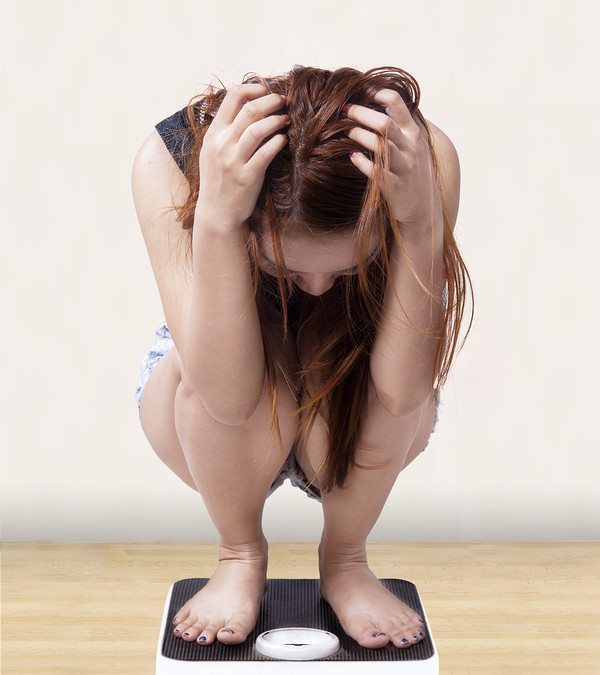I bet you have a love/hate relationship with your scale, don’t you?
Some days you step on it and like what you see. You’re down a pound or more. Yay!
Other days, maybe even the very next day, you see the scale’s back up a pound or two.
Now you want to chuck your scale right out the window.
Maybe that’s not such a bad idea.
Lies Your Scale Tells You
Talk to anyone on a quest to lose weight and what’s their biggest focus?
You guessed it. The bathroom scale.
It’s an obsession of epic proportions.
The truth is that scale is a big, fat liar.
Oh, and it’s fickle too.
It changes faster than a hummingbird flits from flower to flower.
It rarely tells you the same thing twice, even within a short time span.
Let me ask you, would you let another person treat you like this? Of course not!
And you shouldn’t let your scale do it either.
Time To Fight Back
So with all of these reasons to ditch your scale, what tool should you use to measure your results?
Many tools work well for tracking your weight loss goals, but first let’s look at why the scale isn’t one of them.
Your scale is a master of change.
The number on your scale is affected by too many variables.
A reading first thing in the morning gives you one number.
Just a few short hours later, after you’ve eaten or exercised, the number is entirely different.
Today’s reading may differ by a few pounds up or down than yesterday’s. Or tomorrow’s.
Even the food you eat can be an influencing factor.
Eat a Chinese dinner, with its higher sodium level, and the resultant water retention will make for a higher reading.
There are just too many factors that create discrepancies and give false readings.
The scale doesn’t “see” the big picture.
That muscle soreness you feel whenever you start a new workout program or increase the amount of weight you lift?
That pain is due to the breakdown of muscle tissue, which then repairs itself.
This breakdown/repair process causes inflammation and swelling. That inflammation increases the number on your scale.
People freak out after starting a rigorous new program, exercising diligently for several days, to a week, only to have the scale tell them they’ve gained weight.
That weight gain doesn’t accurately reflect what’s happening. It’s just indicating a period of temporary inflammation
You want this process to happen. That’s how you get the best fitness results.
Muscle redistributes as you get fitter.
While identical amounts of muscle and fat weigh the same, they look very different.
Muscle is tighter, leaner and more compact. Fat is puffy and fluffy and takes up more room.
A fitter body can weigh about the same as a less fit body, yet look completely different.
As you add and redistribute muscle while burning fat, your weight may not change much. It might even go up.
But what matters is how you look and feel, not the number on the scale.
The number on the scale does not define you.
You’ve set a goal of losing a considerable amount of weight by a certain time.
You miss that weight loss goal by a few pounds.
That number on your scale now makes you feel like a failure.
Chances are, though, you’ve lost a significant amount of the weight you were targeting.
And when you find you need to buy new, smaller-sized clothes, and you like what you see in the mirror, who cares what the scale says?
That number is just that — a number. And an unimportant one, at that.
Let it go.
What To Use Instead
So if you don’t use the scale, what should you use?
Here’s where you should focus your attention, instead of on the scale:
The mirror.
Your reflection in the mirror is always a much better indicator of success than your scale.
Do you like what you see? Do you see more definition in your body — your arms, your legs, your waistline?
Does your face look thinner? Younger, even?
It’s amazing what weight loss does for your face. The difference between a heavier face and a leaner one is often quite striking.
Weight loss is a fantastic anti-aging tool.
Your belt size.
Ever put on a pair of pants, after you’ve been working on your fitness for a while, only to find they won’t stay up?
You keep hiking them up; you have to cinch down your belt.
They feel baggy and loose.
Going shopping for smaller, more stylish clothing is the biggest emotional high. A fun shopping trip beats the scale any day of the week.
Your stamina and well-being.
It can be subtle and hard to notice gradual changes as they’re happening.
But as you get fitter and lose fat, you’re less likely to get winded walking up stairs.
You have more energy and feel better emotionally. Your mood is upbeat and happy.
You’re able to do more than you could before, physically. You sleep better at night.
These elements are all indicators of better health and fitness.
They can sneak up on you. They can fly under the radar.
Until one day, something brings them to your attention.
Then you realize you are reaching your fitness goals.
Ditch The Scale Once And For All
If you just can’t bring yourself to ditch your scale entirely, at least use it less frequently. There’s no need to step on it every single day.
Your scale is just one tool measuring your results, but it’s not the best one.
Instead, look in the mirror.
Smile at your reflection.
Feel good about the progress you’re making.
And as you walk out of the bathroom, go ahead. It’s okay. Stick our your tongue at that scale.
Blow it a big, fat raspberry.
Hold up your head. Saunter out of the room.
It’s time to celebrate.
Just please don’t invite the scale to the party.
If you enjoyed this post, feel free to pass it along to anyone you think may benefit from reading it. And for information on how to get fit and healthy, scale or no scale, click here now for more information on our Slim, Sexy & Smart program for fitness.
Teri
Latest posts by Teri (see all)
- Sleep Is a Necessary Part of Wellness - February 1, 2018
- Nutrition on the go - January 25, 2018
- Home Workouts: Lower Body - January 18, 2018


